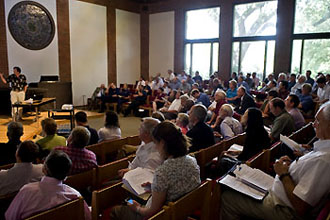"Good Science" Takes on Oil Crisis
A group of academics, government scientists and industry representatives met in Rogers Memorial Chapel on the Tulane uptown campus on Thursday (Sept. 2) for the third in a series of “listening sessions” organized by the Unified Command of the Deepwater BP Oil Spill. The session focused on strategies for measuring oil and dispersant still in the Gulf of Mexico.

Scientists and industry leaders convene at Tulane to talk about research that is needed for measuring oil and dispersant remaining in the Gulf from the BP oil calamity. (Photo by Paula Burch-Celentano)
Tulane provost Michael Bernstein welcomed an audience comprising representatives from the U.S. Coast Guard, BP, the National Oceanic and Atmospheric Administration, the National Science Foundation, the Environmental Protection Agency and eight universities.
“Engaging the talent and expertise of scientists and engineers in responding to this crisis in the Gulf is of paramount importance,” Bernstein said. “We are committed to the use of science ⦠to respond to emergencies like this and help us achieve what we all desire, which is to avoid calamities of this sort in the future.”
Presentations by NOAA pertained to the data already collected, and how academic scientists will be able to use that information for their research.
The ability to access that data is something Vijay John, the Leo S. Weil Professor in the Tulane Department of Chemical and Biomolecular Engineering, calls “very useful” since most scientists don't have the ability or resources to collect samples on their own.
“This is where the real science begins,” John says. “It takes time to get and analyze the data. Now is when the real questions are going to be asked, and new scientific problems can be addressed.”
John says that having Tulane as the venue for such high-level discussions bodes well for the possibility for future collaboration and exchange of information.
“The hope with organizing at Tulane is we will get the opportunity to be involved in some of the research activity with the federal government,” John says. “It all adds up to good science coming from Tulane that helps solve the problem.”
